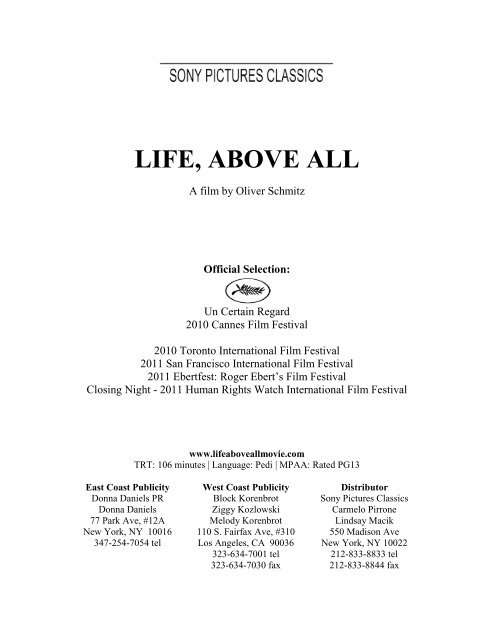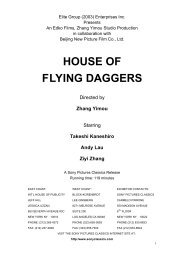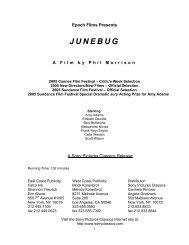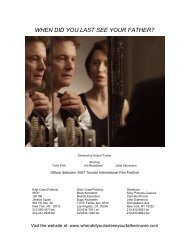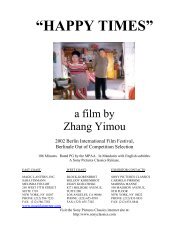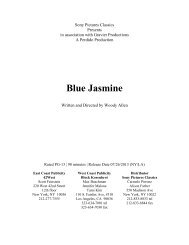press kit - Sony Pictures Classics
press kit - Sony Pictures Classics
press kit - Sony Pictures Classics
Create successful ePaper yourself
Turn your PDF publications into a flip-book with our unique Google optimized e-Paper software.
LIFE, ABOVE ALL<br />
A film by Oliver Schmitz<br />
Official Selection:<br />
Un Certain Regard<br />
2010 Cannes Film Festival<br />
2010 Toronto International Film Festival<br />
2011 San Francisco International Film Festival<br />
2011 Ebertfest: Roger Ebert’s Film Festival<br />
Closing Night - 2011 Human Rights Watch International Film Festival<br />
www.lifeaboveallmovie.com<br />
TRT: 106 minutes | Language: Pedi | MPAA: Rated PG13<br />
East Coast Publicity<br />
Donna Daniels PR<br />
Donna Daniels<br />
77 Park Ave, #12A<br />
New York, NY 10016<br />
347-254-7054 tel<br />
West Coast Publicity<br />
Block Korenbrot<br />
Ziggy Kozlowski<br />
Melody Korenbrot<br />
110 S. Fairfax Ave, #310<br />
Los Angeles, CA 90036<br />
323-634-7001 tel<br />
323-634-7030 fax<br />
Distributor<br />
<strong>Sony</strong> <strong>Pictures</strong> <strong>Classics</strong><br />
Carmelo Pirrone<br />
Lindsay Macik<br />
550 Madison Ave<br />
New York, NY 10022<br />
212-833-8833 tel<br />
212-833-8844 fax
SYNOPSIS<br />
Just after the death of her newly-born sister, Chanda, 12 years old, learns of a rumor that<br />
spreads like wildfire through her small, dust-ridden village near Johannesburg. It<br />
destroys her family and forces her mother to flee. Sensing that the gossip stems from<br />
prejudice and superstition, Chanda leaves home and school in search of her mother and<br />
the truth.<br />
LIFE, ABOVE ALL is an emotional and universal drama about a young girl (stunningly<br />
performed by first-time-actress Khomotso Manyaka) who fights the fear and shame that<br />
have poisoned her community. The film captures the enduring strength of loyalty and a<br />
courage powered by the heart. Directed by South African filmmaker Oliver Schmitz<br />
(Mapantsula; Paris, je t-aime), it is based on the international award winning novel<br />
Chanda’s Secrets by Allan Stratton.<br />
PRODUCTION NOTES<br />
“The novel moved me to tears.” Producer Oliver Stoltz<br />
THE NOVEL<br />
Like many other films, LIFE, ABOVE ALL came about by coincidence, because two<br />
complete strangers happened to be at the same place at the same time. It was in April<br />
2005 that producer Oliver Stoltz attended the renowned hotDOCS-Festivals in Toronto to<br />
present his documentary Lost Children about child soldiers in Uganda. Allan Stratton, a<br />
Canadian writer based in Toronto who also happens to be a film enthusiast, had read<br />
about the film in the paper and contacted Stoltz by email. He told him that he was writing<br />
a book about the tragic fate of child soldiers in Africa and would be interested in meeting<br />
him. And so Stoltz and Stratton met during the festival for a first informal exchange of<br />
ideas. “Later we talked on the phone occasionally,” Oliver Stoltz remembers. “I believe,<br />
I was able to help him with his book because, after making Lost Children, I knew a lot<br />
2
about the topic. At some point, Allan sent me a draft of his novel, but also a copy of its<br />
predecessor, Chanda’s Secrets.<br />
Chanda’s Secrets was first published in 2004 in North America. It won numerous awards<br />
and turned out to be a bestseller in eleven countries. In the book 16-year-old Chanda not<br />
only finds out how ever-present death is in the southern parts of Africa, but also how no<br />
one around her dares to talk openly about the cause of these deaths – AIDS. It’s the<br />
children that suffer most from the consequences. There are an estimated 800,000 AIDSrelated<br />
orphans who have to fend for themselves without any support from the<br />
government or other sources. The film that Oliver Stoltz wanted to make after reading<br />
the novel is dedicated to those children. Chanda’s Secrets is a story about children who<br />
have to take on responsibilities much too early in life and never get to experience a<br />
normal childhood. It is a universal issue that affects children all over the world. Oliver<br />
Stoltz was also fascinated by the idea of “telling a story about how people deal with<br />
‘open’ secrets. Everyone has them. One person is drinking, another betrays others and the<br />
next one is too ashamed to admit to being unemployed.” You keep it to yourself out of<br />
fear of being rejected. How does that affect children who are just beginning to grasp that<br />
dynamic, and how is this corroding society The fear of becoming an outsider forces<br />
everyone to keep quiet or to lie. In the case of Chanda, people around her are being<br />
stigmatized because of AIDS. That happens not just in Africa.” Oliver Stoltz was moved<br />
to tears reading Stratton’s novel: “It is so well told and has the potential to reach an even<br />
broader audience as a film because, in the end, LIFE, ABOVE ALL is very much a<br />
hopeful tale about the power of friendship, solidarity and loyalty.”<br />
“I wrote Chanda’s Secrets, the author Allan Stratton tells us, “to give this pandemic a<br />
face. I wanted the reader to be able to discover human drama therein. In the best of all<br />
cases, stories can develop a lot of strength. You can’t tell them, however, with a pointed<br />
finger or by hammering people with a message. At the core of it have to be individuals<br />
and their experiences. If the author manages to write in such a way that the reader finds<br />
emotional access to the events, the reader will become the characters’ best friend and will<br />
strongly identify with what is happening to them.”<br />
3
The novel triggered similar thoughts and emotions in Oliver Stoltz. “I was most of all<br />
im<strong>press</strong>ed by Chanda’s character,” he explains. “She’s a classical heroine who rebels<br />
against the norms and values of her surroundings.” however, AIDS wasn’t Stoltz’s<br />
primary focus. It was the prejudices described in the book that people who are HIV<br />
positive are subjected to and the ghettoization that comes with it.<br />
Stoltz felt the book definitely went beyond the narrowly conceived topic of AIDS in<br />
Africa. “The same happens in Germany,” he says. “The prejudices and taboos here are no<br />
different than they are in South Africa. What really inspired me in reading Stratton’s<br />
book were the values it represents, which I share wholeheartedly, but also the young<br />
girl’s commitment to helping outsiders and to fighting for her family, the op<strong>press</strong>ed and<br />
for justice. And, of course, the mother-daughter story moved me, and that Allan Stratton<br />
managed to convey how important family is, especially in times when everything begins<br />
to crumble. To me, this is a universal issue.”<br />
“The project came together quickly – only two years passed from initial idea to the first<br />
day of shooting.” -Director Oliver Schmitz<br />
THE GENESIS<br />
It didn’t take Oliver Stoltz long to make up his mind to turn Chanda’s Secrets into a film.<br />
His decision was influenced by the fact that he himself had lived in the southern part of<br />
Africa and that he had toyed with the idea to produce a film that was set there for quite<br />
some time. Now he had found more than just a subject matter that inspired him. Right<br />
away he knew which director he wanted for the project: Oliver Schmitz. He recalls<br />
having been particularly im<strong>press</strong>ed by his first film, Mapantsula (1988), which – shot<br />
with great personal effort and despite numerous prohibitions – portrayed the life of the<br />
black population during apartheid. To make LIFE, ABOVE ALL with a German<br />
director without a personal connection to South Africa was never an option for him.<br />
4
He had known his first choice, Oliver Schmitz, the son of German parents and raised in<br />
South Africa, for some time. Schmitz’s emigration to Germany about 10 years ago had<br />
been for mostly professional reasons: “In South Africa the wait between two projects was<br />
too long for me. And I believed I had to work more.” As a result, he says with a smile on<br />
his face, “I shot for television more or less nonstop” for the last eight years. Among his<br />
work are several successful as well as critically acclaimed series, including “Turkish for<br />
Beginners” and “Doctor’s Diary.” Soon, however, he began harboring the wish to shoot<br />
‘at home’ again. But when the chance presented itself, it was his workload that kept him<br />
from turning his attention to Allan Stratton’s novel – although he had ex<strong>press</strong>ed general<br />
interest in collaborating with Oliver Stoltz on the project: “LIFE, ABOVE ALL sat on<br />
my desk for quite some time – unread. When I finally started to read it, I couldn’t put it<br />
down. The book tells a moving story. I thought that Allan Stratton had found a good way<br />
to show us the impact of AIDS and HIV in southern Africa.” He had barely finished the<br />
book when he made a commitment to the project.<br />
Luckily, finding a screenwriter did not take long. Allan Stratton, who’s made a name for<br />
himself as a playwright, didn’t want to adapt the novel himself. And so producer Oliver<br />
Stoltz, who, in the meantime, had found a Canadian co-producer, followed a<br />
recommendation and hired Dennis Foon (“Mirror Games”), one of Canada’s most<br />
accomplished playwrights and screenwriters. Says Schmitz, “As it turns out, he was an<br />
old friend of Allan’s. He had of course read the book and liked it a lot. That made him an<br />
obvious choice for us.” The producer and director soon invited Foon to come to Berlin to<br />
discuss the direction they wanted to take the screenplay.<br />
“Working with Dennis Foon was fantastic,” says Oliver Schmitz. “The novel is a firstperson<br />
account and we thought long and hard about how we would make do without this<br />
inner voice. What we definitely didn’t want was a voiceover narration. We condensed the<br />
story quite a bit and focused on two sections in the book: the one surrounding Sara’s<br />
funeral and the second and more important one, when Chanda, after Lillian falls ill and<br />
leaves the family, fights to bring her back.” That Chanda is three years younger in the<br />
film than in the book is a result of research that was conducted locally.<br />
5
The team realized how fast kids in South Africa grow up. “In the book Chanda is 16,”<br />
says Schmitz, “but in reality, 16-year-olds have already lost their childlike qualities.”<br />
although the core of the story remained the same, many small changes were made<br />
including in terms of the dialogue. Says Schmitz, “Allan’s novel is loosely set in the<br />
southern part of Africa, but we tried to be very specific when it came to language and<br />
culture. To me such details are very important because I want to make sure that I<br />
represent the reality correctly. If one accomplishes that then one automatically tells a<br />
universal story.”<br />
When Stoltz, Schmitz and Foon took off on a ten-day trip to South Africa, they already<br />
had a first draft of the script – “a solid foundation, so now we could see where we needed<br />
and could insert more reality. Every day we had research appointments and writing<br />
meetings,” explains Stoltz. “In the western hemisphere people tend to generalize when<br />
they speak about Africa. But that creates a construct that doesn’t hold up. We wanted to<br />
be very specific. That’s also why I decided not to shoot the film in English, but in a<br />
wonderful local language called Sepedi. It made the whole thing even more authentic.”<br />
“We hired many locals from Elandsdoorn as actors and to help behind the scenes.”<br />
- Co-Producer Greig Buckle<br />
THE LOCATION<br />
For research purposes the threesome traveled to Elandsdoorn, a township located about<br />
200 kilometers northeast of Johannesburg in the South African province of Mpumalanga,<br />
to visit the Ndlovu Medical Center. Oliver Stoltz had heard about the facility from Vivi<br />
Eickelberg, a music manager he met at a reception in Berlin, who told him about her<br />
efforts to help the Dutch physician Hugo Tempelman, a family practitioner, and his wife<br />
Liesje, who had successfully established the facility in 1994. After a few preliminary<br />
conversations with Tempelman in Berlin, arrangements were made for Stoltz, Schmitz<br />
and Foon to be welcomed by the staff of the Ndlovu Medical Center so that they could<br />
6
gain unobstructed insight into the local conditions. This is also how contact with the<br />
youngest victims of the AIDS pandemic came about, for example, “kids like Esther, who<br />
had lost both of her parents,” says Oliver Schmitz. “We also met a 14-year-old who had<br />
to take care of her two younger sisters, which she’s been doing for four years. Her<br />
relatives aren’t helping her, only a neighbor is, and she’s not old enough to apply for<br />
government assistance. Sadly, her tragic situation isn’t unique, there are way too many<br />
cases like this one. Witnessing this helped us to see the bigger picture and to better<br />
understand the story we were telling.”<br />
When it was agreed upon to travel to Elandsdoorn to conduct research, no decisions had<br />
been made about the eventual shooting location. But Oliver Stoltz was immediately taken<br />
by what he saw in and around the Ndlovu Medical Center. “Elandsdoorn isn’t the type of<br />
slum and massive squalor that we here in Germany associate with a township, which<br />
wasn’t something we want to show in the film in any case. We wanted to show dignified<br />
living conditions, a sort of middle class.”<br />
Greig Buckle, a film producer from Cape Town who co-produced LIFE, ABOVE ALL,<br />
his first German-South African collaboration, was relieved to find out that Oliver Stoltz<br />
and Oliver Schmitz had early on established close contacts in Elandsdoorn, where they<br />
later filmed their story. Says Stoltz, “Once things began to come together, Jerry<br />
Marobyane was assigned to be our contact in Elandsdoorn. He introduced us to the<br />
people and the community as a whole and put us in direct contact with locals. Plus, as an<br />
insider, he made a lot of things a whole lot easier.” People in Elandsdoorn were quite<br />
interested, especially in terms of employment opportunities that the film team might<br />
provide. “Long before we started shooting,” says Oliver Stoltz, “we had a meeting with<br />
the whole community and everyone was there, even representatives from the church, and<br />
during the conversation the question was brought up, and rightfully so, if and how the<br />
town would benefit from our film project.”<br />
That he was able to convince Greig Buckle to come on board was a stroke of luck for<br />
Oliver Stoltz. “On my search for a South African co-producer I met almost every<br />
7
producer in the business. Unfortunately, most of them specialized in financing, meaning<br />
they didn’t care much about the content of a project. They were mostly focused on<br />
servicing. And since many U.S. productions are being shot in South Africa, they are used<br />
to certain dimensions. And so if you don’t have a sizable project and can’t pay more or<br />
less Hollywood paydays then most people turn you away. Plus, I was looking for a coproducer<br />
anyway, someone who cares about the story as much as we did. And with<br />
Greig we found the right match. His enthusiasm for the story convinced many<br />
collaborators in South Africa to participate in the film, even though we couldn’t pay<br />
Hollywood paydays.”<br />
Oliver Schmitz remembers that, although it had been decided early on to shoot in original<br />
locations, “it had been considered to build a set for Chanda’s house – mostly so we<br />
wouldn’t have to depend on the weather. But we quickly realized that we couldn’t have<br />
replicated all these details. In the end you can never recreate the atmosphere you can<br />
capture at original locations in the studio.”<br />
Co-producer Greig Buckle, too, prefers to shoot on location rather than shooting<br />
exclusively in the studio: “It makes everything come across as more realistic. In the case<br />
of LIFE, ABOVE ALL, the story we were shooting in Elandsdoorn partially reflected or<br />
was similar to the everyday life of people who live there. Besides, there are things that<br />
even the best art director can’t capture, even if they recreate the entire original location.<br />
In the end shooting on location adds tremendously to the value of the film. The finished<br />
product gains an enormous amount of depth and realism.”<br />
ON THE SET<br />
LIFE, ABOVE ALL was shot in Elandsdoorn between November 16, 2009, and<br />
February 8, 2010. Despite the tight shooting schedule, the production went on hiatus for<br />
several weeks in January 2010 so that Lerato Mvelase (Lillian) and Aubrey Poole<br />
(Jonah) could put on some weight. In the early part of the shoot they filmed scenes in<br />
which their characters were marked by their illness, AIDS, and were therefore very thin.<br />
8
“A dietary regimen had been put together for me so I could lose weight,” remembers<br />
Lerato Mvelase, who rolls her eyes, laughing. “I really missed my chocolate!” Being on a<br />
diet occasionally put her in a bad mood, but she also learned that “there are so many<br />
things in life that we think we can’t do without – but we can!” The experience was also<br />
useful because it helped her identify with her character, Lillian. Entering Lillian’s house<br />
for the first time was also very helpful. “That’s when I realized how important it was that<br />
we shot on original locations. I could literally smell and sense the poverty and the<br />
loneliness in that house. It was also helpful that I saw the houses of real neighbors when I<br />
stepped outside and that I saw kids with runny noses walking down the street. On a set<br />
where you can still smell the paint and the <strong>press</strong> wood, this would all have been<br />
different.”<br />
LIFE, ABOVE ALL tells a sad story, but director Oliver Schmitz made sure that the set<br />
was a relaxed and happy environment: “That was particularly important for the girls.<br />
They had to be able to relax and be happy during takes.” Lerato Mvelase agrees: “On<br />
days with highly emotional scenes, the First AD asked everyone to be a little more quiet<br />
than usual. Most of the time the set was like bedlam and it was tough to concentrate.” In<br />
that sense the LIFE, ABOVE ALL set was like every other set: Some days were very<br />
stressful and on others everyone was joking around, making noise. But according to<br />
Lerato Mvelase, Oliver Schmitz was always the calm grounding center, “and that was<br />
wonderful, because if he’d lost his calm, we’d all would have lost it. Oliver always took<br />
the time to explain what he wanted. And he only stopped shooting when he got what he<br />
wanted. Sometimes that was rather exhausting. But Oliver is a wonderful director – and a<br />
lovely person.” Author Allan Stratton, who visited the set for several days in December<br />
2009, was im<strong>press</strong>ed with the way Schmitz led his team: “he has no airs of any sort. He’s<br />
incredibly focused and controlled, but never uptight or without a sense of humor. It was<br />
important to him that the atmosphere was easygoing and friendly and I think that is very<br />
important, especially when you are shooting a highly dramatic story such as LIFE,<br />
ABOVE ALL.”<br />
9
“When the author of the book visits the set,” Schmitz says, recalling Stratton’s visit, “one<br />
gets a little nervous. After all, most of the time the original work has been altered<br />
substantially. The fact that Chanda and Esther are younger in the film had initially led to<br />
a lot of conversations with Allan. He had his doubts that it would work – especially when<br />
it came to the relationship with Chanda’s younger siblings. But after he’d seen the actors<br />
he was convinced that it had been the right decision. Allan seemed very happy on the set<br />
and kept complimenting us. In that respect everything went well.”<br />
Although Oliver Schmitz grew up in South Africa, Sepedi, the local dialect in which<br />
LIFE, ABOVE ALL was shot, is a foreign language for him. “But that wasn’t a big<br />
deal,” he says. “In the beginning it created a few problems. But I think I quickly got a<br />
feeling for the sound and the flow of the language. Plus, I had Harriet Manamela, who<br />
played Mrs. Tafa, at my side. She was like a teacher to the children and to me, she was<br />
an advisor when it came to all things Sepedi. When there were difficulties or when<br />
mistakes happened, she immediately pointed them out to me. In addition, I closely<br />
watched the faces and watched the emotions, interpreted them – and I believe, that’s how<br />
it all worked out rather well.”<br />
Quality control was important to Director of Photography Bernhard Jasper, too, who was<br />
also the operator on this shoot: “Because I was working two jobs at once and because<br />
you have to pay a lot of attention in each shot to so many little technical details – making<br />
sure the focus is right and the mic isn’t hanging into the frame – I often couldn’t follow<br />
whether or not the images were tracking emotionally. That’s why I generally watched<br />
them afterwards on the monitor.” In terms of camera technology, producer Oliver Stoltz<br />
explains, “We were at the top of the game. We shot digitally and were the first German<br />
film to shoot with a new ARRI technique in which two frames are shot right after the<br />
other and are merged in post-production to create a scope image. Plus, we were very<br />
lucky to be able to shoot with hawk lenses, which are generally not affordable.” Except<br />
for the extreme weather – it was often very hot or rained heavily – the shoot was<br />
uneventful. “At one point, we were shooting an interior, it was 47 degrees Celsius,” says<br />
Oliver Schmitz. “We had to darken the windows and everyone was sweating like crazy.<br />
10
But except for that everything went very well. It isn’t like that on every shoot. But when<br />
it is, it’s very satisfying.” Shooting a film in South Africa, where he grew up, after being<br />
away for 10 years was a very interesting experience for Schmitz: “I actually noticed<br />
differences between working in Germany and South Africa,” he says, “where everything<br />
has to do a lot more with intuition. Plus in Berlin, I don’t think we’d have had access to<br />
the kind of talent we found in Elandsdoorn. What people here gave me was simply<br />
wonderful.”<br />
Director of Photography Bernhard Jasper couldn’t complain either: “The crew was great.<br />
The actors were amazing. It was a lot of fun. And I can’t say that for every film I’ve<br />
worked on.” Costume designer Nadia Kruger describes her stay in Elandsdoorn as<br />
memorable because, among other reasons, crime was not an issue: “If we had filmed in a<br />
township in Johannesburg we would have needed to be more alert and our safety would<br />
have always been an issue. I live in Johannesburg and I know that it is very, very<br />
dangerous there. It was downright idyllic here in comparison and simply beautiful.” But<br />
producer Oliver Stoltz admits that, in light of their tight budget, everyone had to “make<br />
do”: “But if you bring the right people along – most of them I’ve known for a long time –<br />
and everyone knows the parameters they have to work in, then it’s all doable.<br />
Economizing isn’t my thing. But I have a knack for figuring out where I have to spend<br />
money and where I don’t. In the case of LIFE, ABOVE ALL, it all worked out, not least<br />
because Oliver Schmitz and I think the same way and, having worked in TV, he’s used to<br />
dealing with tight budgets.”<br />
In the past, Oliver Stoltz says, he had worked with directors who, he could tell, didn’t<br />
like the producer to be on the set. He’s not the type of producer, he explains, who gets<br />
involved in everything simply as a matter of principle. On the other hand he finds it vital<br />
to be present on the set frequently – it does, however, depend on the film. The fact that<br />
he had to return to Berlin, right after they had begun shooting LIFE, ABOVE ALL on<br />
location in Elandsdoorn, due to an illness, “wasn’t how I had imagined it. But I watched<br />
the dailies and I knew things were on a roll. With Oliver I didn’t have to worry. First of<br />
all, we had worked closely together on the screenplay and secondly, we had similar<br />
11
ideas. Besides, Oliver was glad when I noticed something back in Germany, which he<br />
would have overlooked down there on the set.” Due to his illness Stoltz also had to give<br />
up his plan to shoot a 45-minute documentary about a little girl who he met while he was<br />
doing research at the Ndlovu Medical Center - the “real Chanda,” so to speak.<br />
In closing, Stoltz points out that he and Schmitz didn’t intend to make a “film about<br />
victims” with LIFE, ABOVE ALL. “When my documentary Lost Children was playing,<br />
I was told I had made a well-intentioned film. On the other hand there were people who<br />
didn’t dare to critique the film because they thought it would have been inappropriate,<br />
considering the topic. But I think that’s wrong. In my opinion films and the stories they<br />
tell have to touch people emotionally first and foremost. If, in addition, they change<br />
people’s minds and help them change their behavior patterns, then that’s the greatest<br />
accomplishment of entertainment. Obviously, LIFE, ABOVE ALL does send a strong<br />
message about AIDS. But, first and foremost, it’s Chanda’s story about growing up.<br />
That’s what makes the film so gripping, so moving.”<br />
THE ACTORS<br />
KHOMOTSO MANYAKA – Chanda<br />
Khtomosto Manyaka comes from Elandsdoorn, South Africa, where she was born in<br />
1996. She attended the local high school and caught the eyes of talent scouts during a<br />
choir performance. She was excited when she was asked to participate in the casting for<br />
LIFE, ABOVE ALL and has turned out to be a natural as an actress. To play the heroine<br />
Chanda, she stepped in front of the camera for the first time.<br />
LERATO MVELASE – Lillian<br />
Lerato Mvelase was born in Soweto, South Africa in 1982. During her school years at<br />
Sacred Heart College, she participated in numerous plays and decided early on to make a<br />
career out of her favorite pastime. In 2002 she graduated from Wits University in<br />
Johannesburg, where she studied acting. In the same year she joined the TV station<br />
CCM1 as an announcer. After a short stint on a soap, she played her first lead role,<br />
12
portraying a college student on the successful series “Mzansi.” She had to relinquish that<br />
role to another actress for the show’s second season because her hosting duties on the<br />
“Mindset Educational TV” (until 2005) demanded most of her time. Since 2005 Lerato<br />
Mvelase has played another student on the television series “Home Affairs.” She has also<br />
appeared on stage in productions of “a Midsummer Night’s Dream,” “Grease” and<br />
“Moulin Rouge,” and regularly takes on singing engagements. LIFE, ABOVE ALL is<br />
her first feature film.<br />
HARRIET MANAMELA – Mrs. Tafa<br />
Harriet Manamela, born in 1971 in Diepkloof, South Africa, participated in numerous<br />
theater projects after graduating from high school in the Alexandra Township. Against<br />
the wishes of her father, who wanted her to study law, she became an actress. In 1987 she<br />
appeared on stage for the first time at the Market Theatre in Johannesburg and has done<br />
so repeatedly to this day. She played her first television role in 1998 on “Soul City,“<br />
which led to numerous parts on television, among them the miniseries “When We Were<br />
Black.“ She was first directed by Oliver Schmitz in 2000 when she played a minor role in<br />
his gangster drama Hijack Stories. Later she was seen alongside stars such as Don<br />
Cheadle, Juliette Binoche and Samuel L. Jackson in international productions including<br />
Hotel Rwanda and In My Country. For her performance in Isidingo she was nominated<br />
for a vita award for best supporting actress. In her spare time Harriet Manemela works on<br />
theater projects for children in the townships of Johannesburg.<br />
KEAOBAKA MAKANYANE – Esther<br />
Keaobaka Makanyane, born 1996, calls Elandsdoorn, South Africa, her home. There she<br />
participated in a casting session for LIFE, ABOVE ALL and was cast on the spot for the<br />
role of Esther, Chanda’s best friend. She sings in the school choir and wants to become<br />
an actress when she grows up.<br />
AUBREY POOLO – Jonah<br />
Aubrey Poole, born 1977, is also playing his first feature film role in LIFE, ABOVE<br />
ALL. By the age of six he had discovered his passion for theater, which he pursued from<br />
13
then on with great determination, even though his grandfather had planned a career in<br />
politics for him. He appeared on numerous smaller stages until he joined the South<br />
African State Theatre in Pretoria in 1999. It is there that he shortly after met his mentor,<br />
the South African director Paul Grootboom. Aubrey Poolo has classical theater training<br />
but also knows modern African dance including Gumboot Dance, Pantsula Dance and<br />
Kofifi.<br />
THE FILMMAKERS<br />
OLIVER SCHMITZ – Director<br />
Oliver Schmitz, the child of German immigrants, was born in 1960 in Cape Town, South<br />
Africa. After graduating from high school in 1978, he enrolled in the Michaelis School of<br />
Fine Arts in Cape Town and graduated four years later with a BA in Fine Arts. During<br />
his college years he worked at “Scratch,” the legendary nightclub he co-founded in the<br />
early 80’s, as a co-manager and DJ.<br />
In 1983 Schmitz began a two-year apprenticeship as an editor in Johannesburg, and from<br />
1985 to 1986 he worked as an editor for the WDR in Dortmund, one of the largest<br />
German public broadcasters. He returned to South Africa, which was still segregated by<br />
apartheid, to direct his first feature film. Without the permission of the local authorities<br />
he shot the gangster drama Mapantsula in the township of Soweto. The film was well<br />
received by South Africa’s black population and has gained a cult status. The film<br />
debuted at the 1988 Cannes Film Festival in the section “Un Certain Regard” and went<br />
on to receive awards for best film, best director and best editing at the AA Vita Awards.<br />
The film garnered a number of international distinctions, including the Interchurch Film<br />
Award at the Filmfest in Munich and the Australian Human Rights Award. Yet the<br />
highest honors were bestowed on Mapantsula in 2006 when it was named the best South<br />
African film of the decade at the South African Film and Television Awards.<br />
In the late 80’s Schmitz teamed with other documentary filmmakers to direct nine<br />
documentaries in a row, among them Jo’burg Stories, commissioned by Arte in 1997. In<br />
14
2000 he shot his second feature film, Hijack Stories, another gangster drama, which he<br />
wrote and directed. With “increasingly longer waiting periods” between projects he<br />
moved to Germany that year, where he quickly made a name for himself as a successful<br />
television director.<br />
Yet he never turned his back on cinema and, in 2005, Oliver Schmitz and other directors,<br />
including the Coen Brothers, Gus Van Sant and Alexander Payne, directed the feature<br />
film Paris je t’aime (2006), which had its world premiere in Cannes. Throughout his<br />
career, Schmitz received numerous awards, among them the German Television Award<br />
in 2008 for Doctor’s Diary and the Adolf-Grimme Award in 2007 for best director and<br />
the Grand Priz ‘Cinéma Tout Ecran’ at the film festival in Geneva for the critically<br />
acclaimed television series, “Turkish for Beginners.” In 2010 Oliver Schmitz, who lives<br />
in Berlin with his family, plans to shoot his next film, an adaptation of Wladimir<br />
Kaminer’s Russendisco.<br />
FILMOGRAPHY (SELECTION)<br />
2010 LIFE, ABOVE ALL<br />
2009 ALLEIN UNTER SCHÜLERN (TV)<br />
2008 – 2005 TURKISH BEGINNERS/TÜKISCH FÜR ANFÄNGER (TV)<br />
2007 – 2006 DOCTOR’S DIARY (TV)<br />
2003 PARIS JE T’AIME<br />
2000 HIJACK STORIES<br />
1997 JO’BURG STORIES (Documentary)<br />
1987 MAPANTSULA<br />
OLIVER STOLTZ – Producer<br />
Oliver Stoltz, born in 1969 in Bonn, studied film at the HFF Konrad Wolf and at the<br />
University of Southern California in Los Angeles. As an independent producer he<br />
produced numerous feature films, TV movies and documentary films, including<br />
Knockin’ On Heaven’s Door. He also produced several feature films by first-time<br />
15
filmmakers such as Thomas Brussig, Martin Gypkens, Péter Palátsik, Isabel Kleefeld and<br />
Ali Samadi Ahadi. His own directing debut, Lost Children, had a successful theatrical<br />
run, received the German Film Award in 2006 for best documentary and was nominated<br />
for an EMMY in 2009. The film also won numerous prizes at film festivals such as the<br />
Panorama – Audience Award, Belinale 2005, as well as the UNICEF-Film Award and<br />
the Al-Jazeera Award in 2006. He also produced Leroy, Armin Völcker’s blaxploitation<br />
comedy, which was recognized at the German Film Awards in 2008 in the categories<br />
best children and youth film and best score, and in 2009 the comedy Salami Aleikum<br />
from director Ali Samadi Ahadi, which enjoyed a successful theatrical release in<br />
Germany and Austria.<br />
FILMOGRAPHY (SELECTION)<br />
2010 LIFE, ABOVE ALL<br />
THE GREEN WAVE<br />
SPEED<br />
KILLING SEEDS<br />
AM HANG<br />
2009 SALAMI ALEIKUM<br />
2007 LEROY<br />
2005 LOST CHILDREN<br />
1997 KNOCKIN’ ON HEAVEN’S DOOR<br />
DENNIS FOON – Screenwriter<br />
Dennis Foon, born on November 18, 1951, into a working class family in Detroit, studied<br />
religion at the University of Michigan after graduating from high school. But,<br />
encouraged by his friends and teachers, Foon devoted increasing time to his secret<br />
passion: writing and, once his first short story won an award, he enrolled in the MFA<br />
program in creative writing at the University of British Columbia in Vancouver in 1973.<br />
In 1974 he co-founded the Green Thumb Theatre, serving as its artistic director for the<br />
next twelve years. During that time he wrote a number of plays for children and adults<br />
and produced and directed several Green Thumb productions that he took on tour around<br />
16
the world. In 1987 Foon left Vancouver and began to work as a freelancer. He directed at<br />
theatres in Toronto, Copenhagen and London, and devoted more of his time to writing,<br />
completing a number of screenplays for TV movies and feature films. Foon is at home<br />
with many genres- including thriller, sci-fi, family drama and horror. In 1996, he finished<br />
the sensational youth portrait “Little Criminal,” which garnered him numerous awards,<br />
among them the coveted Gemini Award (Canadian Television Award) for best television<br />
drama. Dennis Foon, who lives in Canada, has recently co-authored the film A Shine of<br />
Rainbows, starring Connie Nielsen and Aidan Quinn, which premiered at the 2009<br />
Toronto Film Festival and received two awards at the International Children’s Film<br />
Festival in Chicago, the award of the children’s jury and the audience award.<br />
ALLAN STRATTON – Author<br />
Allan Stratton, born in 1951 in Stratford, Canada, was raised by his grandparents – first<br />
on a farm and later in Kincardine, a small town at Lake Huron. At the age of five he<br />
began to entertain his friends with plays in the family backyard and by eighth grade, he<br />
read a book a day, everything from comics to Shakespeare. At the University of Toronto<br />
he studied English but began to appear frequently on stage as an actor. After completing<br />
his M.A., he devoted his entire time to acting and, as of 1974, has appeared on numerous<br />
Canadian stages. All the while he continued to write and in 1977, his first play, “72<br />
Under the O,” premiered at the Vancouver Playhouse. Stratton moved to New York in<br />
1982, where he joined the legendary Actors’ Studio as a writer/director. In the late 80’s<br />
he returned to Canada. The majority of his plays – dramas as well as comedies –<br />
appeared successfully on stage and received numerous national and international awards.<br />
In the mid 90’s Stratton became the head of the theatre department at the Etobicoke<br />
School of the Arts, where he taught acting, directing and creative writing for the stage<br />
and screen. After a few years he realized how much he missed writing and resigned. At<br />
that point Stratton began to write prose, which garnered him the same success as his<br />
plays. In 2004 his novel Chanda’s Secrets was published and turned out to be a bestseller<br />
that was translated into numerous languages and received awards in many countries. In<br />
March 2008, Stratton, who lives in Toronto with his partner and two cats, published the<br />
17
sequel, Chanda’s War. His most recent work, Borderline, was published in 2010 in the<br />
United States and Canada to rave reviews.<br />
BERNHARD JASPER – Director of Photography<br />
Bernhard Jasper was born in 1972 in Tiengen, Baden-Wurttemberg. His diverse body of<br />
work includes numerous feature and television films as well as many commercials. His<br />
tremendous sense for lighting and composition manifests itself across various genres,<br />
including adventure (Open Water 2: Adrift), musical (Rock It!), comedy (Kleinruppin<br />
Forever) and crime series (“KDD – Kriminaldauerdienst”). His work has garnered him<br />
numerous national and international awards, for example at the London Advertising<br />
Festival and the New York Film Festival. He has also been nominated for the German<br />
Television award as well as the German Film award. LIFE, ABOVE ALL marks his<br />
second collaboration with director Oliver Schmitz, after the successful television series<br />
“Doctor’s Diary.”<br />
CHRISTIANE ROTHE – Production Designer<br />
For more than ten years, Christiane Rothe has worked as a prop master, art director and<br />
production designer on film and television productions. Among her most notable works<br />
are the Oscar® winning international success The Lives of Others and the feature film<br />
Leroy (2007), which received two German Film awards in 2008. Her most recent film is<br />
Chris Kraus’s Poll, for which she created the production design in the summer of 2009 in<br />
Estland.<br />
18
CAST<br />
Chanda<br />
Esther<br />
Mrs. Tafa<br />
Lillian<br />
Aunt Lizbet<br />
Jonah<br />
Iris<br />
Soly<br />
Dudu<br />
Aunty Ruth<br />
Mr. Pheto<br />
Mr. Lesole<br />
Mrs. Lesole<br />
Mr. Nylo<br />
Dr. Chilume<br />
Mr. Chauke<br />
Sipho Mandla<br />
Mrs. Gulubane<br />
Mr. Selalame<br />
Young Man<br />
Hooker<br />
Ruth's Boyfriend<br />
Receptionist<br />
Nurse Nkosi<br />
Police Officer<br />
Jacob<br />
Fireman<br />
Mr. Kamwendo<br />
Granny Thela<br />
Hector<br />
Patient<br />
Mrs. Pheto<br />
Becca<br />
Dudu's Male Friend<br />
Paulo<br />
Truck Stop Hooker #2<br />
Passing Nosy Woman #1<br />
Passing Nosy Woman #2<br />
Nurse<br />
Choir Member #1<br />
KHOMOTSO MANYAKA<br />
KEAOBAKA MAKANYANE<br />
HARRIET MANAMELA<br />
LERATO MVELASE<br />
TINAH MNUMZANA<br />
AUBREY POOLO<br />
MAPASEKA MATHEBE<br />
THATO KGALADI<br />
KGOMOTSO DITSHWENE<br />
RAMI CHUENE<br />
JERRY MAROBYANE<br />
TSHEPO EMMANUEL NONYANE<br />
JOHANNA REFILWE SIHLANGU<br />
VUSI MUZI GIVEN NYATHI<br />
PATRICK SHAI<br />
NELSON MOTLOUNG<br />
ERNEST MOKOENA<br />
MARY TWALA<br />
THEMBA NDABA<br />
SAMUEL MASILELA<br />
CHARLOTTE MPHAKE<br />
BHEKIFA ISAAC NYATHI<br />
SARAH APHANE<br />
FOXY RIET<br />
SOLLY MOENG<br />
MONGEZI MOTAUNG<br />
OUPA MASHILOANE<br />
XOLILE GAMA<br />
MARTHA MAPHAKA<br />
ALAIN MOREL<br />
ALPHINAH MATSEPE<br />
NOMUSA TSHANAGANA<br />
GONTSE MASILELA<br />
MALANANE MOHLAMONYANE<br />
LUNGELO MAHLANGU<br />
REGINA MAKITLA<br />
WENDY MAKUA<br />
ZANELE XEKWA<br />
CAROLIE NKOSI<br />
SELINAH MADIHLABA<br />
19
Choir Member #2<br />
PRISCAR MASHEGO<br />
CREW<br />
Directed by<br />
Produced by<br />
Written by<br />
Based upon the novel "Chanda's Secrets" by<br />
Co-Producer<br />
Co-Producers<br />
Executive Producer<br />
Casting Director<br />
Director of Photography<br />
Art Directors<br />
Key Make-up & Hair Artist<br />
Line Producer<br />
Associate Producer<br />
Edited by<br />
Audio Mixer<br />
Re-recording Mixer<br />
Music Composers<br />
OLIVER SCHMITZ<br />
OLIVER STOLTZ<br />
DENNIS FOON<br />
ALLAN STRATTON<br />
GREIG BUCKLE<br />
THOMAS REISSER<br />
DAN SCHLANGER<br />
HELGE SASSE<br />
MOONYEENN LEE<br />
BERNHARD JASPER, BVK<br />
CHRISTIANE ROTHE<br />
TRACEY PERKINS<br />
NADIA KRUGER<br />
MARTIN HÄMER<br />
DANIELA RAMIN<br />
DIRK GRAU<br />
IVAN MILBORROW<br />
JÖRG HÖHNE<br />
ALI N. ASKIN<br />
IAN OSRIN<br />
20


